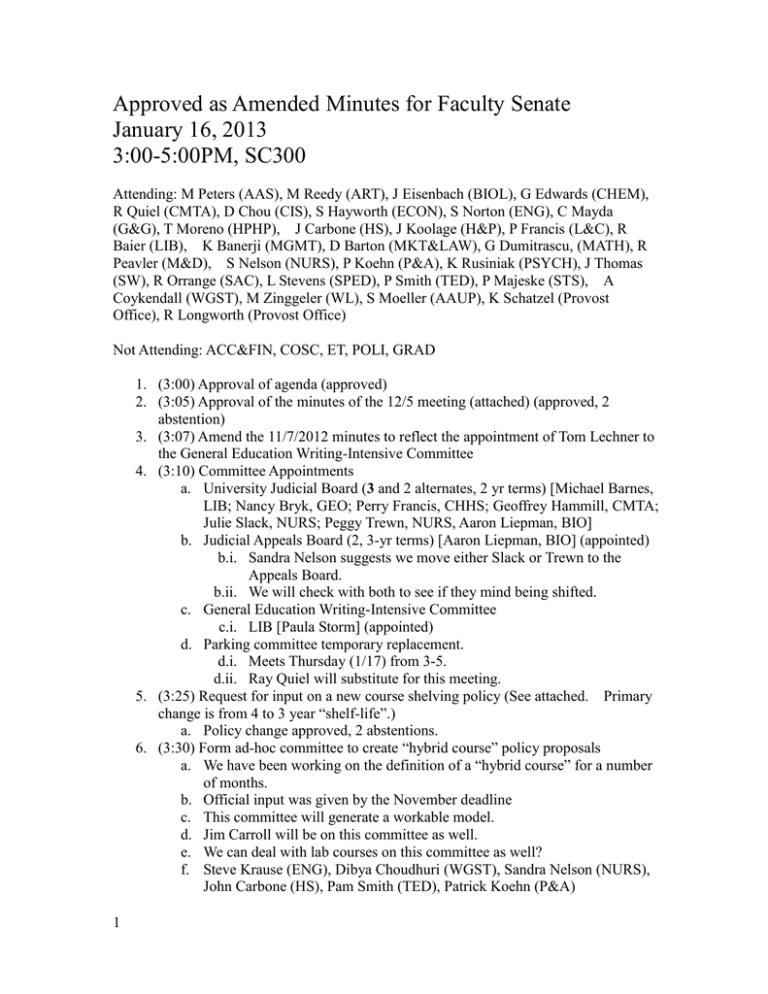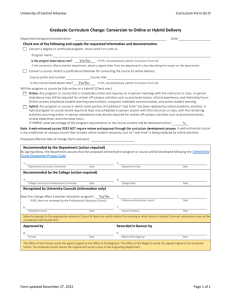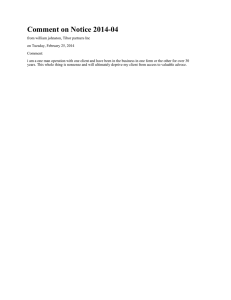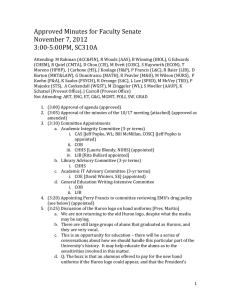Approved as Amended Minutes for Faculty Senate January 16, 2013 3:00-5:00PM, SC300
advertisement

Approved as Amended Minutes for Faculty Senate January 16, 2013 3:00-5:00PM, SC300 Attending: M Peters (AAS), M Reedy (ART), J Eisenbach (BIOL), G Edwards (CHEM), R Quiel (CMTA), D Chou (CIS), S Hayworth (ECON), S Norton (ENG), C Mayda (G&G), T Moreno (HPHP), J Carbone (HS), J Koolage (H&P), P Francis (L&C), R Baier (LIB), K Banerji (MGMT), D Barton (MKT&LAW), G Dumitrascu, (MATH), R Peavler (M&D), S Nelson (NURS), P Koehn (P&A), K Rusiniak (PSYCH), J Thomas (SW), R Orrange (SAC), L Stevens (SPED), P Smith (TED), P Majeske (STS), A Coykendall (WGST), M Zinggeler (WL), S Moeller (AAUP), K Schatzel (Provost Office), R Longworth (Provost Office) Not Attending: ACC&FIN, COSC, ET, POLI, GRAD 1. (3:00) Approval of agenda (approved) 2. (3:05) Approval of the minutes of the 12/5 meeting (attached) (approved, 2 abstention) 3. (3:07) Amend the 11/7/2012 minutes to reflect the appointment of Tom Lechner to the General Education Writing-Intensive Committee 4. (3:10) Committee Appointments a. University Judicial Board (3 and 2 alternates, 2 yr terms) [Michael Barnes, LIB; Nancy Bryk, GEO; Perry Francis, CHHS; Geoffrey Hammill, CMTA; Julie Slack, NURS; Peggy Trewn, NURS, Aaron Liepman, BIO] b. Judicial Appeals Board (2, 3-yr terms) [Aaron Liepman, BIO] (appointed) b.i. Sandra Nelson suggests we move either Slack or Trewn to the Appeals Board. b.ii. We will check with both to see if they mind being shifted. c. General Education Writing-Intensive Committee c.i. LIB [Paula Storm] (appointed) d. Parking committee temporary replacement. d.i. Meets Thursday (1/17) from 3-5. d.ii. Ray Quiel will substitute for this meeting. 5. (3:25) Request for input on a new course shelving policy (See attached. Primary change is from 4 to 3 year “shelf-life”.) a. Policy change approved, 2 abstentions. 6. (3:30) Form ad-hoc committee to create “hybrid course” policy proposals a. We have been working on the definition of a “hybrid course” for a number of months. b. Official input was given by the November deadline c. This committee will generate a workable model. d. Jim Carroll will be on this committee as well. e. We can deal with lab courses on this committee as well? f. Steve Krause (ENG), Dibya Choudhuri (WGST), Sandra Nelson (NURS), John Carbone (HS), Pam Smith (TED), Patrick Koehn (P&A) 1 7. (3:35) Proposal to change name of Faculty Development Center [Peggy Liggit] a. Suggested name changes: a.i. B.K. Nelson Teaching and Learning Center (preferred) a.ii. B.K. Nelson Center for Teaching and Learning b. Comment: Original discussion included professional development, so that is why “Teaching and Learning” was avoided. c. Comment: “Facilitator” is a better term than “Teacher” d. Comment: This seems to neglect Research. d.i. Learning was intended to include Research. e. Comment: Concerned that the word “Faculty” has been removed. f. Comment: How about “Faculty Resource Center.” g. Comment: Stanford has a similarly named facility, intended for faculty. h. Comment: “Professional Learning” is becoming the proper term. i. We will need to move this forward to the next meeting. j. PL: How do we bring lecturers and adjuncts into this? How is the “Faculty Development Center” viewed by these instructors? 8. (3:40) Proposed changes to IAAC By-Laws [Robert Orrange] (see attached) a. Back in the fall semester we introduced possible changes to the bylaws. We now have approval from Athletics and the President, so we are bringing this forward. b. One of the changes is to increase the number of faculty members serving on this committee. c. We would like to have a senate member on that body to act as co-chair. d. In the past there have been very knowledgeable people out there that would do well on this committee. e. Changes approved, 1 abstention. 9. (3:50) Review of Cost/SCH budgeting [Provost Schatzel] a. How we budgeted for this year is how we have budgeted in the past. The base is always the previous year. b. “Revenue Based” and “Activity Based” are the same thing. Funding and activity are matched. c. From the PPT presentation: c.i. Looking at graph of College SCH production for CAS (left side) and everyone else (right side) c.ii. We need to be able to address shifts in budgets, matching funds with activity. c.iii. Comment: Does this include graduate programs? A: Yes, but it is important to realize that this is a first pass at the idea, and done at the University level, not within the individual colleges. d. Provost encourages a Faculty Senate Budget Committee to provide input to Academic budget issues. d.i. UBC provides a bridge to the administration for budget issues, but input is not part of their bylaws. Hence the need for a separate committee. [Note from Mahmud Rahman: Input from the UBC is in their bylaws. This comment was made in error.] e. Instead of looking at dollar amounts alone, it looks at how much per credit 2 hour the individual colleges are spending – it provides a sense of scale. f. Tries to show a dynamic metric of activity. g. PPT: Cost/SCH model slide g.i. Cost savings (efficiency savings) have been part of the budget for a long time. g.ii. “Efficiency” is the cost-savings for this year. CHHS is struggling to meet the needs, CoE‟s enrollment in in decline. g.iii. Comment: Some colleges support centers, some have centers outside of the college. How was this taken into account? A: These numbers are actual spending. g.iv. Comment: A good grant writing program would not be supported here. A: It does, as faculty salary is included into the grant. g.v. Comment: Accreditation must play a part in this. A: This is why we use incrementals – there was no comparison with other universities, etc. This method generates these kinds of conversation. g.vi. Comment: The numbers we have are just data – there are no methods there, just data, correct? A: Correct. h. Comment: We are waiting for more information about divisional cuts, but Academic and Student affairs took a $4M cut, Academic Affairs itself took a $1.4M cut. It is unclear why CoE took a 3% cut. A: Their enrollment is down, so they took a 3% cut. i. Future budget changes will need input – this is why we need a Faculty Senate Budget Committee. i.i. This committee always looked at the spring/summer budget after the fact – this committee would be different in all but name. j. Overall, the Colleges are doing a fine job of spending. There is no recall of funding (no sweeps). k. Comment: The way the expenses are determined is fuzzy. This includes advising (if present), etc. These are the TOTAL cost of the college. l. Comment: Is this a way to figure out expenses and needs? A: Yes. m. Comment: Some of the comments that you have made would have made a difference in the concerns all over campus. A narrative would have been helpful. A: We can put together a narrative. 10. (4:20) Continuing discussion of academic advising [Rhonda Longworth] a. Feeling was that we did not have enough time in the last meeting to talk about advising. b. Did a search for A&S-focused advisors. We need even more than these three positions, so we now have 5 new advisors, 3 focused on A&S, 1 on undeclared and “intent” students, and one on H&HS. c. Chris Foreman will be working with the head of the advising office to train these advisors. d. Q: What does DRC mean? A: Disability Resource Center e. Goal is to get students the services they need, both with more people and better trained people. f. Setting up a development system to get our current advisors through the 3 same training system. g. Q: With the new advising system, there was an agreement to sign, but there was no additional information to support advisors to keep advisors out of trouble. A: We are being very serious about student privacy, they are all responsibilities we had before, but now they are codified. h. Q: What about the 15 credits per semester? A: The goal is to have people graduate in 4 years. Have taken the suggestions as a friendly amendment, and have changed the language to “taking 30 credit hours in a single academic year” in order to graduate in 4 years. i. We are looking at possibilities of offering “late start” classes. This means more subterms in the fall and winter terms, just like they are in the summer terms. j. Q: The advisor office here is a satellite office? A: Yes. k. Q: How many advisors are there? A: 7 now, there will be 12. The advisors focus on general education, credit hour minimums, etc. Faculty will still advise their majors. l. Q: How much are we allowed to report our student demographics when it comes to retention rates, etc? A: Some take demographics into account, some just look at “traditional” student populations. The current rules include just FTIACs that finish in 4 years. Working on raising this issue. There is a growing awareness of this issue. m. Q: What if a HS student takes a course at WCC? Are they a FTIAC? Not until they become a “degree-seeking student.” n. Q: Can you give us retention information (not just the governmentrequired data)? A: Will come back and present this data. o. Q: Are the ECA students counted as part of our incoming first year class? A: No. 11. (4:40) Committee Reports a. EEFC [Patrick Koehn] a.i. First meeting of the year is 1/17. b. Univ. Budget Comm. [Mahmud Rahman] b.i. No report. b.ii. Q: What does the possibility of a Faculty Senate Budget Committee mean for us? A: The Provost is looking for a committee focused on Academic Affairs. Members of the UBC will be asked if they would like to serve, but it will greatly increase their workload. c. Huron logo meeting [Abby Coykendall] c.i. From a student perspective, they do not want a degree that includes the Huron logo – they feel that it degrades their degree. The president wants to keep meeting to talk about it, but there is already a general consensus. c.ii. Promotional material is still coming out with the Huron logo. The President needs to make a statement or do something to stop the proliferation of the logo. c.iii. Students also felt they were being held hostage by a group of 4 earlier students. c.iv. Needs input to get the President to make a firm, clear statement against this. c.v. Question/comment from the floor: Has the level of insult been explained to the folks that support this logo? The students back then stood so firmly against it – this has to be an alumni fundingdriven thing. 12. (4:55) President‟s Remarks a. The next Senate meeting is February 6, SC300. Next Executive Board meeting is Jan. 30, SC320 5 Committee Appointments University Judicial Board Geoffrey Hammill I have been a UJB member for the past several years and I would very much like to continue to serve on the board. I have found this job to be the most rewarding service that I have done. I feel that I accomplish something for the campus community and, also, for the students who come before us. Unlike other committee work, serving on a UJB hearing gives one the feeling of actually having done something positive. Additionally, I enjoy working with the student members of the board (undergraduate and graduate). I know that they benefit from witnessing the mature approach of the faculty members and I have been told (by student members) that they appreciate having faculty working with them and that they learn from them. I know that Meredith Blaine and Jesus Hernandez appreciate my work and that they would both like to have me continue on the board. I hope that you will support my request to continue on the UJB. Thanks for the note and for the opportunity to present my case. Michael Barnes I would, once again, be willing to serve on the University Judicial Board. I have served on it for a couple of terms now and feel that the board serves an important role with students on campus. This committee was also personally rewarding as it allowed me to get a better sense of student concerns and a closer view into their daily lives as students at EMU. I would be happy to serve another term. Judicial Appeals Board Aaron Liepman Since arriving at EMU in 2006, I have taught a writing intensive biology class to approximately 200 undergraduate students and a proposal development class to about 40 graduate students. Key components of both courses are proper citation practices and clear explanations of what academic dishonesty is. Despite this, there have been more than a few students in these courses who failed to grasp the need to never plagiarize and they were reported to the Office of Student Conduct and Community Standards (OSCCS). This has resulted in my developing a good working relationship with Jesus Hernandez, Director of OSCCS. It has also provided me with a great deal of experience interacting with students whose cases have been processed by his office. I view the opportunity to serve as an active member of the University Judicial Board or the Judicial Appeals Board as a chance to contribute to maintaining academic integrity at EMU. Responding to the Provost’s Request for Input on the Definition of Online Courses 6 On October 26, 2012, the Provost’s Office requested input on a proposed definition of online courses at Eastern (see attached). The Faculty Senate has examined the proposed policy defining on-line courses. We object to the relative rigidity of some aspects of the definition. We suggest three changes: The sentence “A „hybrid class‟ is a section of a for-credit course delivered 50% in-person and 50% on-line” be changed to “A „hybrid class‟ is a section of a forcredit course delivered less than 100% in-person and the remainder on-line.” The sentence “A hybrid class must include an in-person session in the first and last week of the term” to be “A hybrid class must include an in-person session in the first week and, for those classes that require a course evaluation, another inperson session toward the end of the term.” The sentence “The dates and times of all the in-person sessions must be identified in the course schedule” be changed to “The dates and times of all the in-person sessions must be identified in the course syllabus.” From Jim Carroll, 10/26/2012: The Provost‟s office is requesting input on the following definitions An “in-person class” is a section of a for-credit course delivered 100% in-person (face-toface). A course section must be identified in the course schedule (using Banner codes) as an in-person class before the students begin enrolling in the class. The dates and times of the in-person class must be identified in the course schedule. An in-person class may use web-based portals to deliver course materials, but these materials should not substitute for in-person sessions. A “hybrid class” is a section of a for-credit course delivered 50% in-person and 50% online. A course section must be identified in the course schedule (using Banner codes) as a hybrid class before students begin enrolling in the class. A hybrid class must include an in-person session in the first and last week of the term. The dates and times of all the in-person sessions must be identified in the course schedule. An “on-line class” is a section of a for-credit course delivered 100% on-line. A course section must be identified in the course schedule (using Banner codes) as an on-line class before students begin enrolling in the class. 7 As an exception, an on-line class may have one (1) scheduled in-person class session with students during the semester. If the course has an in-person session scheduled, the date of that session must be identified in the course schedule before students register for the course. Any course may be delivery as in-person classes, hybrid classes, and/or on-line classes. The primary need for these definitions is to clarify the expectations and the differences between in-person, hybrid, and on-line classes for the students, faculty, departments, and the colleges before the students begin registering for the classes. The percentages above are based on a 50 minute in-person session per week during a 15 week semester being equivalent to 1 credit hour. Courses with additional contact hours are expected to follow the same percentages of the course contact hours. Input from Faculty Senate is requested by November 30. 8 Committee Appointment Ballot a. University Judicial Board (4 and 2 alternates, 2 yr terms) [Perry Francis, CHHS] b. Judicial Appeals Board (3-yr terms) c. General Education Writing-Intensive Committee 9 a.i. COB a.ii. LIB


